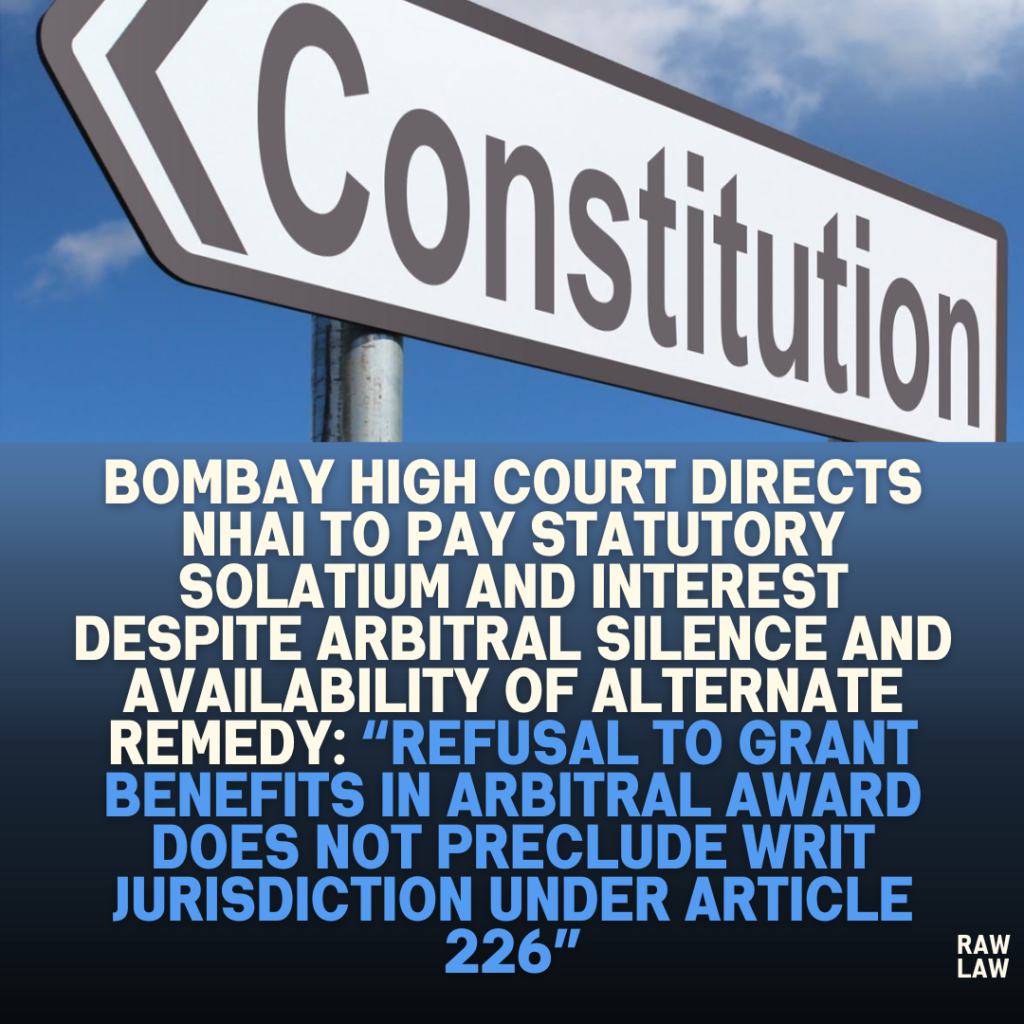Court’s Decision
The Bombay High Court allowed a batch of writ petitions filed under Article 226 of the Constitution, holding that the National Highways Authority of India (NHAI) must pay the petitioners the statutory benefits of solatium and interest under the Right to Fair Compensation and Transparency in Land Acquisition, Rehabilitation and Resettlement Act, 2013, in light of the Supreme Court’s ruling in Union of India v. Tarsem Singh [(2019) 9 SCC 304].
The Court rejected the objection raised by NHAI regarding the availability of an alternate remedy under Section 37 of the Arbitration and Conciliation Act, 1996, and directed NHAI to make payment within four months.
Facts
The petitioners were landowners whose properties had been acquired under the National Highways Act, 1956. Dissatisfied with the compensation awarded, they had invoked Section 3G(5) of the Act and approached arbitration.
The arbitrators enhanced the compensation but did not award solatium or interest in terms of Tarsem Singh. The petitioners challenged the award under Section 34 of the Arbitration Act before the Principal District Judge (PDJ), Nashik. The PDJ agreed with the petitioners that solatium and interest were payable as per Tarsem Singh but declined to grant relief due to a binding High Court precedent (Rishabhkumar v. Union of India, 2021 SCC OnLine Bom 4561).
Issues
- Whether the petitioners were entitled to invoke writ jurisdiction under Article 226 despite the availability of a statutory appeal under Section 37 of the Arbitration Act.
- Whether the failure of the arbitrator and the Section 34 court to award solatium and interest could be corrected under writ jurisdiction.
- Whether the decision in Tarsem Singh applied to the petitioners’ cases, despite no express award of such benefits in arbitration.
Petitioners’ Arguments
- The benefits of solatium and interest were statutory entitlements under the 2013 Act and mandated by the Supreme Court in Tarsem Singh.
- The arbitrator’s failure to grant such benefits could not be corrected under Section 34 or 37 of the Arbitration Act due to jurisdictional limitations.
- A writ petition was therefore the only efficacious remedy.
- The objection of alternate remedy was merely a procedural technicality and should not obstruct substantive justice.
Respondents’ Arguments
- The NHAI, through its counsel, contended that the writ petitions were not maintainable because the petitioners had an alternate remedy under Section 37 of the Arbitration and Conciliation Act.
- It was further argued that the petitioners should file a claim before the Competent Authority with necessary documents instead of directly approaching the High Court.
- The respondents asserted that the writ petitions should be dismissed for bypassing the statutory appellate process.
Analysis of the Law
- The Court emphasized that availability of an alternate remedy is not an absolute bar to the exercise of writ jurisdiction.
- Referring to M/s Godrej Sara Lee Ltd. v. Excise and Taxation Officer [2023 (384) ELT 8 (SC)], the Court noted that exceptional cases involving pure questions of law are fit for adjudication under Article 226.
- The Court found that no disputed questions of fact were involved and the entitlement to solatium and interest was undisputed, thus satisfying the conditions for invoking writ jurisdiction.
Precedent Analysis
- In Tarsem Singh, the Supreme Court held that landowners are entitled to solatium and interest under the 2013 Act even in acquisitions under the National Highways Act.
- The Court noted that even in Rishabhkumar, although the High Court held that Section 34 and Section 37 courts could not modify arbitral awards to add such benefits, it did not dispute the entitlement itself.
- The Court relied on its earlier ruling dated 8 April 2025 in W.P. No. 11932 of 2019, where it had granted similar relief under Article 226 based on Tarsem Singh.
Court’s Reasoning
- The High Court observed that relief under Section 37 would be futile, since even the appeal court could not modify arbitral awards to add statutory benefits, per Rishabhkumar.
- The Court held that “such a remedy can hardly be called an efficacious one” and labeled NHAI’s objection as “unfortunate and unfair.”
- The Court stressed that these were not adversarial proceedings, and the entitlement was never seriously disputed.
- The NHAI had already expressed willingness before the PDJ to pay solatium from the date of Tarsem Singh.
- Invoking Article 141 and 144 of the Constitution, the Court stated that the law laid down by the Supreme Court is binding and all authorities must act to give it effect.
Conclusion
The Court allowed the writ petitions, directed NHAI to pay solatium and interest in terms of Tarsem Singh within four months, and made the Rule absolute without any order as to costs. The petitioners were not required to file contempt petitions for enforcement.
Implications
- This judgment reinforces that statutory entitlements like solatium and interest under land acquisition laws cannot be denied due to technical limitations in arbitration.
- The ruling safeguards landowners’ rights, ensuring they are not denied legitimate compensation due to procedural hurdles.
- It sends a strong message that Article 226 remains a vital tool to prevent injustice, especially when alternate remedies are inefficacious.
- The judgment also underlines the binding nature of Supreme Court precedents, mandating compliance from all authorities.




Pingback: Supreme Court Directs Uniform Service Conditions for Court Managers Across India Within 3 Months: “Their Assistance is Needed for a Proper Administrative Set-up in Courts” - Raw Law
Pingback: Delhi High Court Holds Delay in Filing Amended Written Statement in Commercial Suit Can Be Condoned if Prejudice Would Otherwise Be Caused: “If Amended Written Statementis Taken Off the Record, It Would Cause Serious Prejudice to the Defendant” — Al